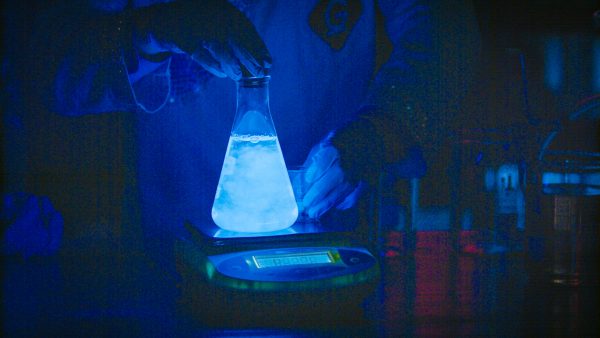Chemistry Definition
Chemistry studies how substances interact and change to form new substances. For example, through chemical reactions, atoms rearrange to form new molecules.
View Lesson on Chemical Reactions
Become a member to get full access to our entire library of learning videos, reading material, quiz games, simple DIY activities & more.
Become a member to get full access to our entire library of learning videos, quiz games, & more.
Plans & Pricingto watch this full video.

Access All Videos
and Lessons, No Limits.
Access All Videos

No credit card required,
takes 7 sec to signup.
No card required

Ready-to-go lessons
that save you time.
Ready-to-go lessons
If you are on a school computer or network, ask your tech person to whitelist these URLs:
*.wistia.com, fast.wistia.com, fast.wistia.net, embedwistia-a.akamaihd.net
Sometimes a simple refresh solves this issue. If you need further help, contact us.
Chemical Reactions
Fun Facts
- Chemists combine substances based on their properties, which determine how they will interact to form new chemicals.
- Chemists study interactions between substances to solve problems and advance the world of science.
- Chemical engineers study chemical reactions to make medicines and form new products that solve unique problems.
Why Do We Need To Know About Chemistry
Chemistry helps us understand how everything around us is made and why things work the way they do. It’s helps us make new medicines that can make us healthier. For example, by mixing chemicals in different ways, scientists can create new medicines that fight diseases better.
Also, knowing about chemistry can lead to jobs where you solve real-life problems. Chemical engineers might work on making rockets better with new types of fuel, and other scientists use chemistry to invent things like bendy solar panels or clothes that can charge your phone. This shows how chemistry is key to making new technologies and helping the environment.
Frequently Asked Questions
Check out the Full Lesson on Chemical Reactions
In this lesson, we learn that:
- When substances undergo chemical reactions their properties change.
- The total number of atoms does not change throughout a chemical reaction.
- Scientists use chemical reactions to create new materials and medicines.
Related Topics
- Algae Definition
- Cast Fossils Definition
- Chemical Reaction Definition
- Chemistry Definition
- Collision Definition
- Compound Definition
- Conductor Definition
- Convection Definition
- Definition Of Force
- Dichotomous Key Definition
- Electromagnetic Spectrum Definition
- Electron Definition
- Energy Definition
- Fertilizer Definition
- Freezing Definition
- Frequency Definition
- Genetic Factors Definition
- Germination Definition
- Glacier Definition
- Habitat Definition
- Lever Definition
- Light Reflection Definition
- Lunar Mare Definition
- Magnetic Field Definition
- Mass Definition
- Mitochondria Definition
- Natural Selection Definition
- Opaque Definition
- Particle Model Of Matter Definition
- Pendulum Definition
- Photosynthesis Definition
- Pollen Definition
- Property Definition
- Pulley Definition
- Reactants Definition
- Seismologist Definition
- Snow Definition
- Soil Definition
- Sound Definition
- Surface Runoff Definition
- Symbiosis Definition
- Tides Definition
- Water Distribution Definition
- Wave Definition
- Weather Definition
- Weathering Definition
- Wedge Definition
- Wind Erosion Definition
Start a Free Trial Today. Get a $5 Amazon Gift Card!
Teachers! Start a free trial & we'll send your gift card within 1 day. Only cards left. Try it now.
Select Grade
Select Subject
This email is associated with a Science Kit subscription. Kit subscriptions are managed on this separate page: Manage Subscription

-
Download InvoiceScience & Math$/yr
-
Download InvoiceScience Only$/yr

access all lessons
• No credit card required •
"My students loved the videos. I started the video subscription in May and used them as a review before the state test, which I know contributed to 100% of my class passing the state test."
Rhonda Fox 4th Grade Teacher, Ocala, Florida
• No credit card required •
"My students loved the videos. I started the video subscription in May and used them as a review before the state test, which I know contributed to 100% of my class passing the state test."
Rhonda Fox 4th Grade Teacher, Ocala, Florida
• No credit card required •
Already a member? Sign In
* no credit card required *

* no credit card required *
* no credit card required *


no credit card required
Skip, I will use a 3 day free trial
Enjoy your free 30 days trial
-
Unlimited access to our full library
of videos & lessons for grades K-5. -
You won’t be billed unless you keep your
account open past your 14-day free trial. -
You can cancel anytime in 1 click on the
manage account page or by emailing us.
-
Unlimited access to our full library of videos & lessons for grades K-5.
-
You won't be billed unless you keep your account open past 14 days.
-
You can cancel anytime in 1-click on the manage account page.
Cancel anytime in 1-click on the manage account page before the trial ends and you won't be charged.
Otherwise you will pay just $10 CAD/month for the service as long as your account is open.
Cancel anytime on the manage account page in 1-click and you won't be charged.
Otherwise you will pay $10 CAD/month for the service as long as your account is open.
We just sent you a confirmation email. Enjoy!
DoneWe use cookies to make your experience with this site better. By using this site you agree to our use of cookies. Click "Decline" to delete and block any non-essential cookies for this site on this specific property, device, and browser. Please read our privacy policy for more information on the cookies we use.Learn More
We use cookies to improve your experience. By using this site, you agree to our use of cookies. Click "Decline" to block non-essential cookies. See our privacy policy for details.Learn More



























































































































